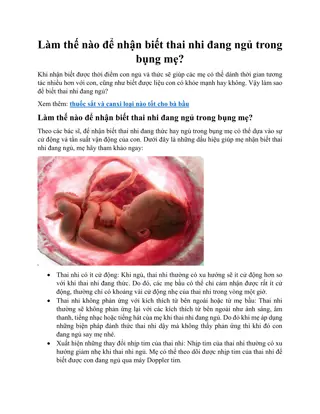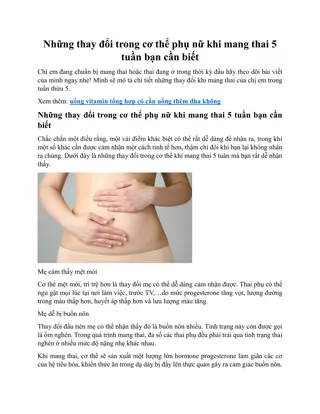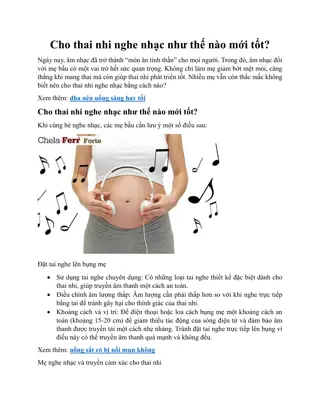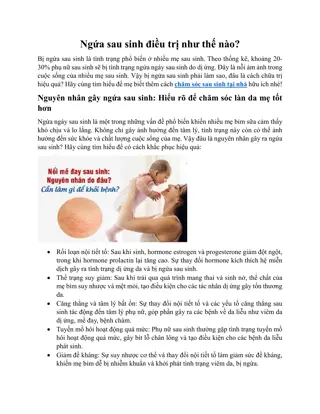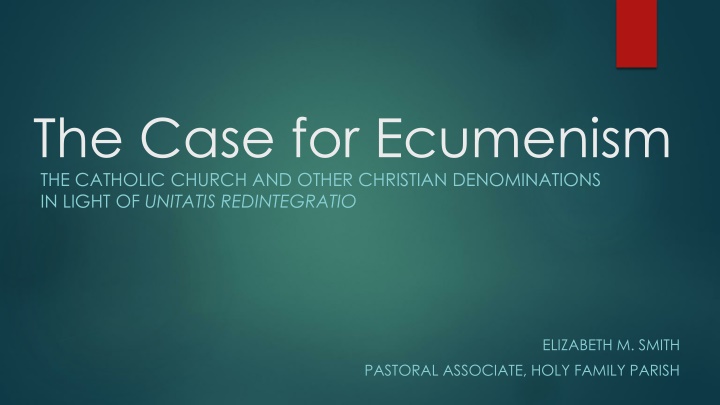
Insights into Christian Ecumenism and Ecclesiology
Explore the significance of ecumenism and ecclesiology within Christianity, delving into the historical context of Christian Councils and theological debates. Gain valuable insights from recent Anglican-Lutheran agreements on episcopacy viewed from a Catholic perspective, shedding light on unity across Christian denominations.
Download Presentation

Please find below an Image/Link to download the presentation.
The content on the website is provided AS IS for your information and personal use only. It may not be sold, licensed, or shared on other websites without obtaining consent from the author. If you encounter any issues during the download, it is possible that the publisher has removed the file from their server.
You are allowed to download the files provided on this website for personal or commercial use, subject to the condition that they are used lawfully. All files are the property of their respective owners.
The content on the website is provided AS IS for your information and personal use only. It may not be sold, licensed, or shared on other websites without obtaining consent from the author.
E N D
Presentation Transcript
The Case for Ecumenism THE CATHOLIC CHURCH AND OTHER CHRISTIAN DENOMINATIONS IN LIGHT OF UNITATIS REDINTEGRATIO ELIZABETH M. SMITH PASTORAL ASSOCIATE, HOLY FAMILY PARISH
My interest in the subject Experience as ministerial intern in a UCC congregation Dissertation topic: Ecclesiology and Ecumenism: Recent Anglican- Lutheran Agreements on Episcopacy from a Catholic Perspective
Some important terms Ecumenism, ecumenical: oikoumen, the ordering of a household Ecclesiology: ekklesia, church structure Schism: Split or division among people
Background Christian
Background Christian Councils: 325 Nicea Trinity, Creed Denounced Arianism (Just man) Denounced Docetism (God in a man suit) Accepted homoousios 381 Constantinople Added to the Creed Denounced Apollonarism (That divine nature replaced will) 431 Ephesus Denounced Nestoriainism (2 natures/2 persons) Defined Mary as theotokos Denounced Pelagianism (earn salvation) 451 Chalcedon Denounced Monophysitism (1 nature/1 person) Orthodox position: 2 natures/1 person Without mixture or confusion
Background Christian Councils: 431 325 Nicea Trinity, Creed Denounced Arianism (Just man) Denounced Docetism (God in a man suit) Accepted homoousios Assyrian Orthodox 381 Constantinople Added to the Creed Denounced Apollonarism (That divine nature replaced will) 431 Ephesus Denounced Nestoriainism (2 natures/2 persons) Defined Mary as theotokos Denounced Pelagianism (earn salvation) 451 Chalcedon Denounced Monophysitism (1 nature/1 person) Orthodox position: 2 natures/1 person Without mixture or confusion
Background Christian Councils: 431 451 325 Nicea Trinity, Creed Denounced Arianism (Just man) Denounced Docetism (God in a man suit) Accepted homoousios Assyrian Orthodox Oriental Orthodox 381 Constantinople Added to the Creed Denounced Apollonarism (That divine nature replaced will) 431 Ephesus Denounced Nestoriainism (2 natures/2 persons) Defined Mary as theotokos Denounced Pelagianism (earn salvation) 451 Chalcedon Denounced Monophysitism (1 nature/1 person) Orthodox position: 2 natures/1 person Without mixture or confusion
Background Christian Next issue: Authority 431 451 Bishop of Rome Vs. Bishop of Constantinople Assyrian Orthodox Oriental Orthodox
Background Christian Next issue: Authority 431 451 Bishop of Rome Vs. Bishop of Constantinople Assyrian Orthodox 1054 Great Schism Oriental Orthodox Roman Catholic Eastern Orthodox
Background Christian 431 451 Assyrian Orthodox 1054 Great Schism Oriental Orthodox Roman Catholic Eastern Orthodox
Background Christian 431 451 Assyrian Orthodox 1054 Great Schism Oriental Orthodox Roman Catholic Eastern Orthodox
Background Christian 431 451 Assyrian Orthodox 1054 Great Schism Oriental Orthodox Roman Catholic Eastern Orthodox Eastern Orthodox
Background Christian 431 451 Assyrian Orthodox 1054 Great Schism Oriental Orthodox Roman Catholic Eastern Orthodox 1517 The Protestant Reformation Protestant Eastern Orthodox Roman Catholic
Background Christian 431 451 Assyrian Orthodox 1054 Great Schism Oriental Orthodox Congregational Church of Christ Roman Catholic Eastern Orthodox 1517 The Protestant Reformation Adventist 1534 Baptist Protestant Mennonite 1845 1738 1814 1536 1530 1537 1693 1801 1907 1607 1844 Southern Baptist 1885 Anabaptist 1607 1901 Church of Nazarene Evangelical HutteriteAmish Methodist Calvinist AME Anglican Lutheran Pentecostal Eastern Orthodox Roman Catholic Presbyterian
Background Christian 431 451 Eastern Rite Catholics Assyrian Orthodox 1054 Great Schism Oriental Orthodox Congregational Church of Christ Roman Catholic Eastern Orthodox 1517 The Protestant Reformation Adventist 1534 Baptist Protestant Mennonite 1845 1738 1814 1536 1530 1537 1693 1801 1907 1607 1844 Southern Baptist 1885 Anabaptist 1607 1901 Church of Nazarene Evangelical HutteriteAmish Methodist Calvinist AME Anglican Lutheran Pentecostal Eastern Orthodox Roman Catholic Presbyterian
Background Christian 431 451 Assyrian Orthodox 1054 Great Schism Oriental Orthodox Roman Catholic Eastern Orthodox 1517 The Protestant Reformation Protestant Lutheran Eastern Orthodox Roman Catholic
Background Martin Luther 1517 Ninety Five Theses Indulgences The Eucharist Ecclesiology: Sola Scriptura Justification: Sola Fide 1. Grace 2. Faith 3. A change of heart 4. Good works
Background Martin Luther The Catholic Reformation 1517 Ninety Five Theses 1545-63 Council of Trent Indulgences Abolished indulgences The Eucharist Defined Transubstantiation Ecclesiology: Sola Scriptura Ecclesiology: Scripture and Tradition Justification: Sola Fide Justification addressed continually 1. Grace 2. Faith Later Councils 3. A change of heart Justification 4. Good works Ecclesiology the historic episcopate
Current State of the Question Some items that divide Christian denominations: Theology of Eucharist Ecclesiology and episcopacy Authority Scandals Justification Sacraments (especially the sacraments of vocation) The role of women Sexual morality
Current State of the Question Some items that divide Christian denominations: Theology of Eucharist Ecclesiology and episcopacy Authority Scandals Justification Sacraments (especially the sacraments of vocation) The role of women Sexual morality However: a broken Church is hard to sell! (Matthew 28) Enter: The ecumenical movement What is at stake? Glossing over important theological differences vs. hardness of heart
Highlights of the Ecumenical Movement Today, in many parts of the world, under the inspiring grace of the Holy Spirit, many efforts are being made in prayer, word and action to attain that fullness of unity which Jesus Christ desires. The Sacred Council exhorts all the Catholic faithful to recognize the signs of the times and to take an active and intelligent part in the work of ecumenism. (UR4) The World Missionary Conference, Edinburgh, 1910 The World Council of Churches 1937 348 member churches Dialogues (Catholic-Lutheran, Catholic-Methodist, Anglican-Lutheran) many of which have already resulted in full communion or merger Churches working in co-ministry even while divided Announcement: World day of Prayer 1st Parish Church, Monument Square, Concord Friday, March 3, 11am, 1-hour prayer service and lunch
Unitatis Redintegratio The Restoration of Unity Decree on Ecumenism November 21, 1964
Unitatis Redintegratio The restoration of unity among all Christians is one of the principal concerns of the Second Vatican Council. Christ the Lord founded one Church and one Church only. However, many Christian communions present themselves to men as the true inheritors of Jesus Christ; all indeed profess to be followers of the Lord but differ in mind and go their different ways, as if Christ Himself were divided. Such division openly contradicts the will of Christ, scandalizes the world, and damages the holy cause of preaching the Gospel to every creature. (UR1) I appeal to you, brothers and sisters, in the name of our Lord Jesus Christ, that all of you agree with one another in what you say and that there be no divisions among you, but that you be perfectly united in mind and thought. My brothers and sisters, some from Chloe s household have informed me that there are quarrels among you. What I mean is this: One of you says, I follow Paul ; another, I follow Apollos ; another, I follow Cephas ; still another, I follow Christ. Is Christ divided? Was Paul crucified for you? Were you baptized in the name of Paul? (1 Cor 1:10-13)
Unitatis Redintegratio Biblical appeal: That they may all be one (UR8, John 17:21) Ecumenism a definition: The term "ecumenical movement" indicates the initiatives and activities planned and undertaken, according to the various needs of the Church and as opportunities offer, to promote Christian unity. These are: first, every effort to avoid expressions, judgments and actions which do not represent the condition of our separated brethren with truth and fairness and so make mutual relations with them more difficult; then, "dialogue" between competent experts from different Churches and Communities. (UR4)
Unitatis Redintegratio Key problem: what denotes a lawful variety (UR17) vs. a false irenicism, in which the purity of Catholic doctrine suffers loss (UR11)? Hierarchy of truths (UR11) Legitimate diversity (UR14) Pose no burden beyond what is essential (Acts 15:28) The way and method in which the Catholic faith is expressed should never become an obstacle to dialogue with our brethren. It is, of course, essential that the doctrine should be clearly presented in its entirety. Nothing is so foreign to the spirit of ecumenism as a false irenicism, in which the purity of Catholic doctrine suffers loss and its genuine and certain meaning is clouded (UR11)
So, what is essential? Acts 15:28-29: For it has seemed good to the Holy Spirit and to us to impose on you no further burden than these essentials:29that you abstain from what has been sacrificed to idols and from blood and from what is strangled and from fornication. If you keep yourselves from these, you will do well. Karl Rahner and Heinrich Fries: The Unity of the Churches Doctrines contained in the Apostles Creed and the Nicene Creed (Nicene-Constantinople) Scripture How would you answer this question?
Unitatis Redintegratio In the document, we see a subtle interplay between the Catholic Church embracing a change of heart attitude of self-criticism and flexibility and it clinging tightly to essentials. Even in the beginnings of this one and only Church of God there arose certain rifts, which the Apostle strongly condemned. But in subsequent centuries much more serious dissensions made their appearance and quite large communities came to be separated from full communion with the Catholic Church - for which, often enough, men of both sides were to blame. The children who are born into these Communities and who grow up believing in Christ cannot be accused of the sin involved in the separation, and the Catholic Church embraces upon them as brothers, with respect and affection. For men who believe in Christ and have been truly baptized are in communion with the Catholic Church even though this communion is imperfect. The differences that exist in varying degrees between them and the Catholic Church - whether in doctrine and sometimes in discipline, or concerning the structure of the Church - do indeed create many obstacles, sometimes serious ones, to full ecclesiastical communion. The ecumenical movement is striving to overcome these obstacles. But even in spite of them it remains true that all who have been justified by faith in Baptism are members of Christ's body, and have a right to be called Christian. (UR3)
Unitatis Redintegratio A Spirit of self criticism Catholics, in their ecumenical work, must assuredly be concerned for their separated brethren, praying for them, keeping them informed about the Church, making the first approaches toward them. But their primary duty is to make a careful and honest appraisal of whatever needs to be done or renewed in the Catholic household itself. (UR4) Although the Catholic Church has been endowed with all divinely revealed truth and with all means of grace, yet its members fail to live by them with all the fervor that they should, so that the radiance of the Church's image is less clear in the eyes of our separated brethren and of the world at large, and the growth of God's kingdom is delayed (UR4) Christ summons the Church to continual reformation as she sojourns here on earth. The Church is always in need of this, in so far as she is an institution of men here on earth. Thus if, in various times and circumstances, there have been deficiencies in moral conduct or in church discipline, or even in the way that church teaching has been formulated - to be carefully distinguished from the deposit of faith itself - these can and should be set right at the opportune moment. (UR6) There can be no ecumenism worthy of the name without a change of heart. (UR7) Spiritual ecumenism (UR8)
Unitatis Redintegratio A Tight Grip on Doctrinal Integrity, Catholic Fullness We believe that Our Lord entrusted all the blessings of the New Covenant to the apostolic college alone, of which Peter is the head, in order to establish the one Body of Christ on earth to which all should be fully incorporated who belong in any way to the people of God. (UR 3) Baptism therefore establishes a sacramental bond of unity which links all who have been reborn by it. But of itself Baptism is only a beginning, an inauguration wholly directed toward the fullness of life in Christ. Baptism, therefore, envisages a complete profession of faith, complete incorporation in the system of salvation such as Christ willed it to be. (UR22) Issues with the sola scriptura of the West But while the Christians who are separated from us hold the divine authority of the Sacred Books, they differ from ours - some in one way, some in another - regarding the relationship between Scripture and the Church. (UR 21) Urges special consideration of the Eastern Churches (UR14) in being theologically so close: Eucharist, liturgy, devotion to Mary, apostolic succession, monastic traditions
Unitatis Redintegratio And yet, in its division, it s an incomplete fullness Divisions among Christians prevent the Church from attaining the fullness of catholicity proper to her, in those of her sons who, though attached to her by Baptism, are yet separated from full communion with her. (UR4) We believe that this unity subsists in the Catholic Church as something she can never lose, and we hope that it will continue to increase until the end of time. (UR4)
Questions to Consider How important is ecumenism, really? Should the goal of ecumenism be total reunification? Communion? Partnership? If we believe in a legitimate diversity, what are the essentials? Older Christian issues included ecclesiology, justification, the solas of authority, Christology. What are today s issues? Gay marriage? Role of women? Eucharistic theology? Ecclesiology? Thank you for your ideas!
















